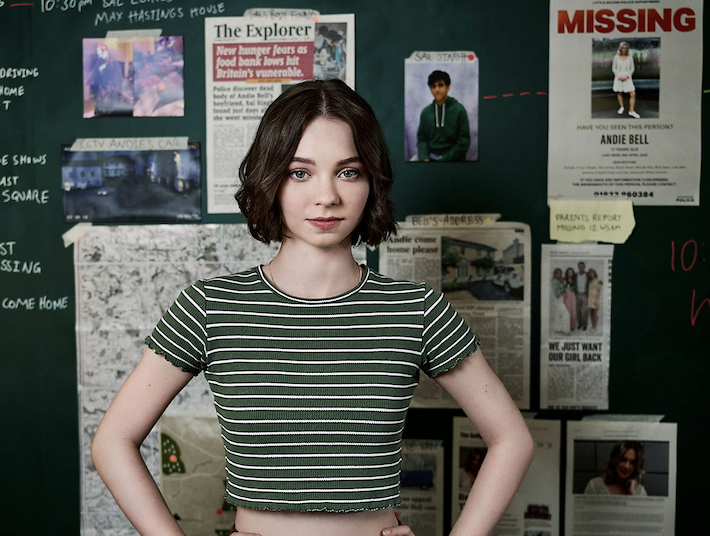
Finally, after a slew of bad teen dramas with terrible names (eg The Summer I Turned Pretty, Teen Wolf, etc) comes a good teen drama from the BBC, with a slightly twee name but an adorable leading lady. Emma Myers stars as Pip, a precocious A level student with a penchant for Gothic literature and a hunch that her community is harbouring a secret. She’s not wrong. In the fictional village of Little Kilton, Buckinghamshire, the disappearance five years ago of beautiful, popular schoolgirl Andie still haunts the neighbourhood. Andie’s image is chalked on the sides of brick buildings, her golden locks flowing and angel wings lifting her heavenwards. She was a good girl; or so everyone thought. Pip was her junior by a couple years and remembers seeing her on the day she disappeared, her face mascara-streaked and a finger to her lips in a gesture saying, ‘Don’t tell’. Pip also saw Andie’s boyfriend looking for her—the boyfriend who would later commit suicide after confessing to Andie’s murder. It’s a done deal, the police said. But Pip has a nose for a lie and she follows the trail, to her own peril. A Good Girl’s Guide to Murder, based on the novel by Holly Jackson, is what teen dramas should be—sharp, sweet, heartfelt and dark at the same time. It tackles the biggest issues; divorce, rape, suicide, murder. But unlike other teen dramas, it does so with class and sensitivity. Watching it, I was reminded of 13 Reasons Why, that 2017 abomination from Netflix about a girl who commits suicide and leaves a spiteful trail of notes for her friends to work out why she did it. That series ended up turning teen suicide into a petty he-said-she-said gossip fest. Awful stuff.
A Good Girl’s Guide is an adventure story about an earnest young detective whose efforts to uncover the past stir up pain and anger in her community; and plenty of danger too. The great thing about Pip is that she reacts exactly how a teen girl in her situation would. Her curiosity and cleverness constantly get her into trouble with schoolfriends, with the police—and worse, with her mother. The brilliant Anna Maxwell Martin plays her mum, a cool and only occasionally stern parent who has high hopes for Pip—Trinity College, Cambridge in fact—and doesn’t want her messing up her chances by nosing around on a murder case. Pip’s stepdad (Gary Beadle) is a warm presence who at first seems like a nonentity, but who develops one of the most important relationships with Pip in the series. Nothing escapes Pip, including her parents’ relationship problems. When she confronts her stepdad about his secret nights spent at a hotel (of course Pip manages to steal a hotel guest book), he owns up. Yes, he and her mother had trouble. No, he wasn’t cheating on her. He had a wobble, but it wasn’t her mother’s fault. ‘I realised I needed to make some changes,’ he said in an almost-too-perfect speech. ‘And you and your mother and brother were not the problem.’
Pip’s still devastated. A glimpse into the messy world of adult relationships isn’t a pretty one. But it serves a vital lesson for her and for all teens; your parents aren’t perfect. Their marriage isn’t perfect. But crucially, Pip’s stepdad shows her that it’s worth holding onto. The threat of her mum and stepdad’s separation is one of the emotional climaxes. This is why the show is great. The stakes are very teenage-centric, but that doesn’t diminish them. The late teen years are some of the most important we’ll ever experience, with the highest of highs and the lowest of lows, and Pip’s struggles brought me right back to 2007 when I was 17.
Plus, the show’s mystery is a good one. The most tantalising combination for teens is romance and mystery, and the character of Ravi serves both. Zain Iqbal plays the younger brother of the boyfriend who killed himself, Sal. Ravi is convinced his brother Sal is innocent, both of murder and suicide. After initial resistance—he doesn’t want to open old wounds— Ravi soon joins Pip in the chase, sneaking into suburban homes and hotels and pulling fire alarms to get away. Do they get a little too close in a closet while hiding from the baddie? Maybe. Are they OK with that? Yes.
If there is a cliché in the show, it’s the evil posh boy who enjoys other people’s suffering. Max Hastings (not related) seems like the ultimate posh villain to begin with. And that’s exactly what he is. I kept waiting for his story arc, but there wasn’t one. Matthew Baynton plays the relatable English teacher who also happens to be Pip’s best friend’s dad. His charm and ‘down with the kids’ vibe toe the line between cool parent and a little overinvolved.
By the end of the six-part series Pip has lost a family member, some friendships, and all of her optimism for life, but her tenacious spirit and determination to seek justice lift her to her feet again and again. Forget the simpering vampires and sexy werewolves of previous teen soaps—Pip is the ideal protagonist for today’s teens. She’s cool in her crop tops and high waisted jeans; she’s kind to her little brother; she aces her DBQ interview. She’s a good daughter, a good student and a good friend. She’s also a little bit sassy to her mother. She’s utterly believable and I rooted for her the whole way.






